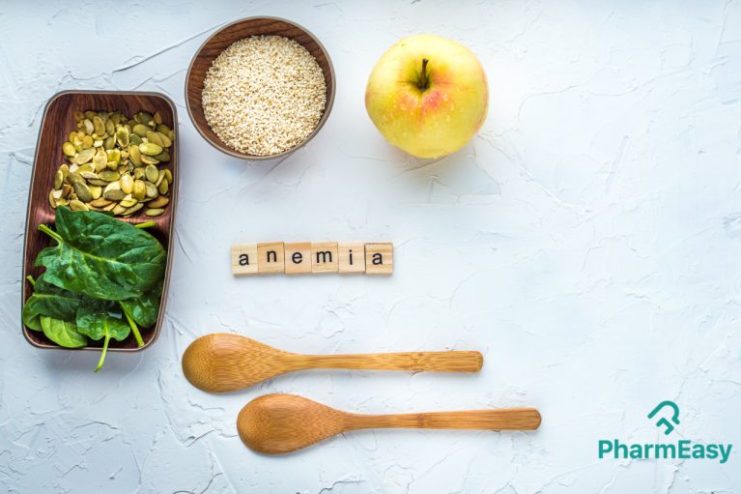The Basic Things You Should Know About Anaemia!
By Saksham Bhatia +2 more

Get more insightful and
helpful tips to
treat Diabetes for FREE



Download PharmEasy App




Register to Avail the Offer
Send OTPBy continuing, you agree with our Privacy Policy and Terms and Conditions
By Saksham Bhatia +2 more
Anaemia is a common condition which is characterised by reduced quality or quantity of healthy red blood cells. Red blood cells contain haemoglobin which is responsible for transporting oxygen throughout the body. Reduced haemoglobin percentage or lesser number of red blood cells may lead to an inadequate supply of oxygen to different parts of the body. Anaemia widely affects children, women, and men at any stage of life.

The prevalence of anaemia among six groups, as per the National Family Health Survey 5 (2019-21), is 25.0 percent in men (15-49 years) and 57.0 percent in women (15-49 years). 31.1 percent in adolescent boys (15-19 yrs), 59.1 percent in adolescent girls,52.2 percent in pregnant women (15-49 years) and 67.1 percent in children (6-59 months).
Table of Contents
Anaemia is a condition in which there is a lack of healthy red blood cells that carries oxygen to all body tissues, and a low red blood cell count shows a lower level of oxygen in your blood than normal levels. It can be mild to severe.
The severity of anaemia depends on the level of haemoglobin. Haemoglobin is a protein present in red blood cells that transport oxygen from the lungs to the other parts of the body. Haemoglobin formation requires iron, so most of the people who have anaemia have a shortage of iron.
There are various types of anaemia depending upon the underlying cause.
What are the causes of anaemia?
Many conditions lead to anaemia, including nutritional deficiency to major underlying causes. Common causes of anaemia are as follows –
1: Iron-deficiency anaemia – It is one of the common types of anaemia that often affects more women than men and is more common during pregnancy. In this anaemia, your body does not have enough iron to form haemoglobin that helps to carry oxygen through your blood to all parts of your body. Symptoms of iron-deficiency anaemia can be –
2: Aplastic anaemia – In this anaemia, your body cannot produce enough red blood cells because of bone marrow-related disorders.
3: Hemolytic anaemia – This anaemia occurs when your body itself damages your red blood cells.
4: Pernicious anaemia – Because of the deficiency of vitamin B12, pernicious anaemia occurs.
5: Sickle-cell anaemia – This is a genetic disorder that affects your red blood cells.
If you have mild anaemia, you may not have many symptoms. The sign and symptoms depend on the cause and level of haemoglobin in the body. Signs and symptoms of anaemia might include:
Anaemia treatment depends on its underlying cause. There are many treatment options based on the type and severity of anaemia.
In iron or vitamin B12 deficiency anaemia, you need to eat healthy foods and sometimes need nutritional supplements.
In some other cases, if anaemia is severe and caused because of some pathology, then the doctors may prescribe some medications and injections to treat anaemia, like Erythropoietin injections, hormonal medicines, or some antibiotics.
Other forms of anaemia may require intense treatment, like surgery to stop blood loss or blood transfusion.
If you are experiencing any symptoms of anaemia, consult your doctor (preferably a haematologist), but there are things which you can do on your own, mainly to improve your diet. The best diet plan for anaemia includes food rich in iron and other vitamins. Here we enlisted some essential foods which can help you deal with anaemia –
1: Green leafy vegetables: Green, dark vegetables are the best source of iron. They may include –
Some of them, Swiss chard or collard greens, are also rich in folate and can be useful in folate deficiency anaemia. You can have vitamin C-rich foods such as oranges while eating these green vegetables, as vitamin C may increase the absorption of iron.
2: Nuts and seeds
Many nuts and seeds are nutritious dense foods that contain a tremendous amount of iron. You can eat them raw or roasted as they have the same amount of iron. You can eat them as a snack or sprinkle them on a salad. Nuts and seeds may include –
3: Lean meat and poultry foods
Lean meat and chicken breast contain a high amount of iron, almost 22% of your recommended dose. To enhance iron absorption, pair it with vitamin C-rich vegetables such as spinach, tomatoes, and red peppers.
4: Seafood
Seafood such as oysters is one of the best ways to supplement your diet if you are anaemic. Most of the fish contain iron, especially shellfish such as oysters, clams, and crabs. Other types of fish –
5: Beans
Beans are the most inexpensive and best source of iron for vegetarians. Some iron-rich beans are as follows –
Anaemia can be a mild to severe form of blood disorder. It should not be ignored. A doctor can help diagnose and manage the condition well depending upon the types of anaemia you are suffering from.
Disclaimer: The information included on this site is for educational purposes only and is not intended to be a substitute for medical treatment by a healthcare professional. Because of unique individual needs, the reader should consult their physician to determine the appropriateness of the information for the reader’s situation.
Ref
Comments